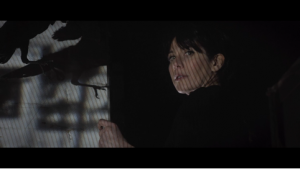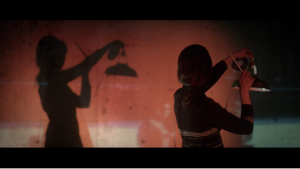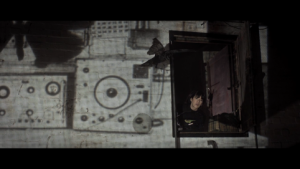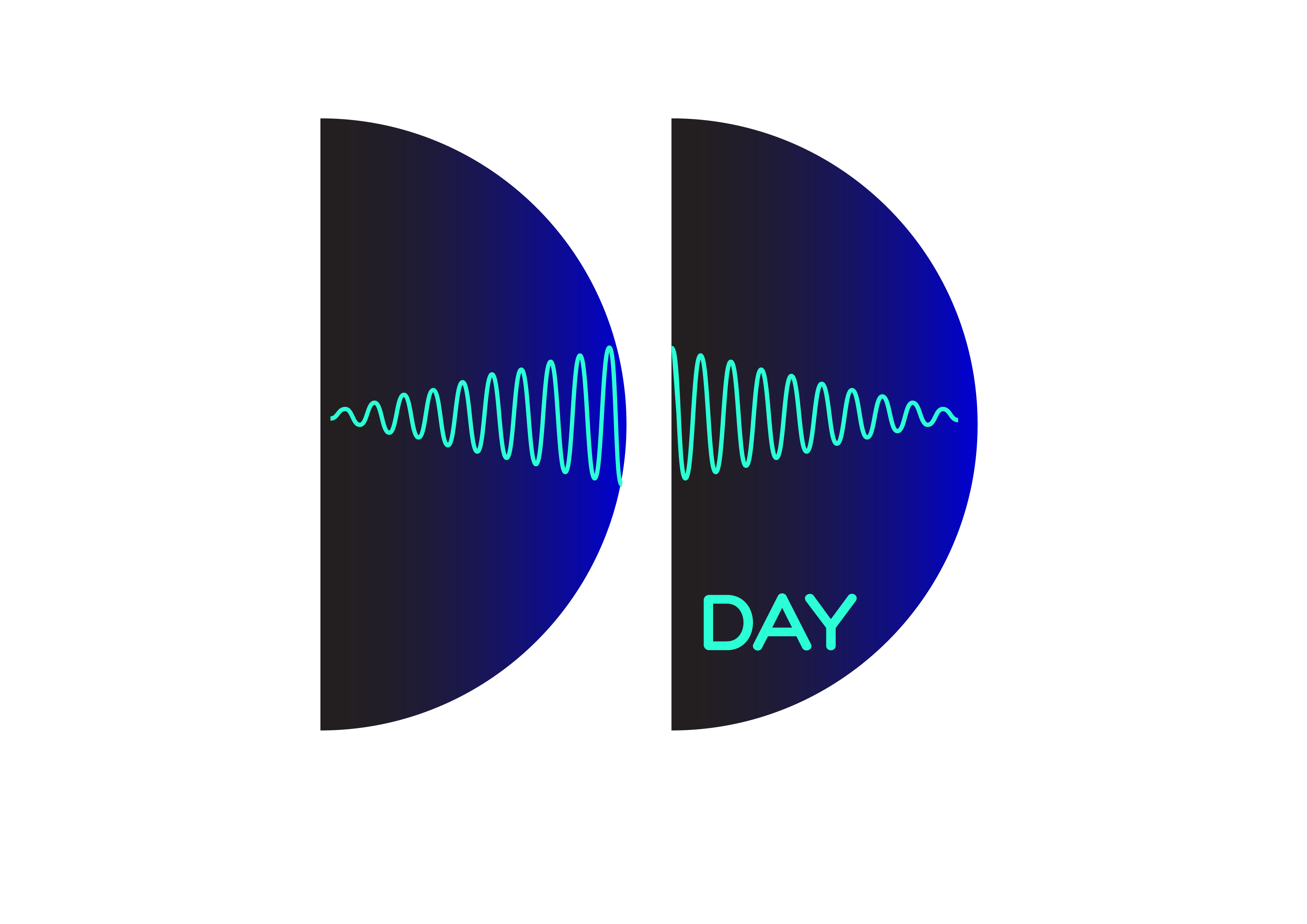By Caroline Catz
All images from Delia Derbyshire: The Myths And The Legendary Tapes care of the author
Caroline Catz’s short film Delia Derbyshire: The Myths And The Legendary Tapes (2017) screened at this year’s BFI London Film Festival and is a playful, inventive and respectful portrait of Delia Derbyshire’s time at the BBC Radiophonic Workshop leading up to her decision to leave Maida Vale and relocate to northeast Cumbria in the mid-1970s where she worked at the LYC Museum and Gallery.
In this piece for Delia Derbyshire Day 2018, Caroline discusses her long-term interest in Delia Derbyshire and her approach to exploring Delia’s life and work in film, which will continue in an expanded feature-length project going into production in 2019.

Way back in 2008 a friend and I were talking about Delia Derbyshire and her realisation of the Doctor Who theme tune, and how that piece of music had stayed with us throughout our lives and why so many people we knew shared a similar memory. As kids, how could we have all known to take refuge behind our sofas after only hearing the first few bars of the Doctor Who theme tune?
We decided there must have been a hidden frequency, something that tuned us all into a very primal sound, something terrifying that Delia must have experienced herself.
Delia talks about the sound of the air raid sirens during the Coventry blitz being her first experience of electronic music when she was really small and so began a conversation with my friend late into the night.
Does experience live in the body? Can that individual experience be generative through the process of art and music? Is that why Delia’s realisation of Ron Grainer’s score is so powerful? Could it be the most powerful piece of music since Stravinsky’s The Rite of Spring… yes, it was definitely time to turn in… but you get the idea.
The conversation stayed with me and I became intrigued about Delia, her compositions and her process of working, her body of work at the BBC as well as her freelance work and then of course the puzzle of why she left the BBC so abruptly in 1973.
There’s a lot of speculation as to why Delia left the BBC. There’s a real gap there that inevitably gets filled with all kinds of theories and projected myths.
I’m intrigued by Delia’s life and work after the Radiophonic Workshop and fascinated about her choice to leave London and her move to Cumbria.
What Delia represents to me is an archetype of someone who is simultaneously an irritant and at the same time useful in a system. A woman working in an environment not designed for her, resulting in an inevitable burn out after being worn down by her contribution being downplayed, endless compromises and battles leading her eventually to go on a quest for solace and peace of mind by moving to Cumbria and making a new start.
That conversation in 2008 led me on the path to the Centre for Screen Studies at the University of Manchester and to a wonderful meeting with David Butler. I’d heard that the University had recently acquired Delia’s archive consisting of 267 tapes of Delia’s work and boxes of her papers found in her attic after her death.
When David showed me the archive, stored temporarily in an office until it found a lasting home at the John Rylands Library, I was really moved by the sight of these boxes, of Delia’s life story packed away. It was a poignant moment. Particularly the idea that for most of us, our lives will ultimately be represented by what we leave behind in a few old cereal boxes.
My first thought was that I’d better invest in some really good ones, before realising that it’s probably what you have to put in them that counts in the end. I think what Delia had kept in her Bran Flakes boxes is pure magic and a real gift to any one who wants to listen.
I spent the afternoon listening to some of the tapes that David and Louis Niebur had digitised. These were wonderful pieces that were so powerful and affecting and I was moved by how beautiful and melodic they were and yet not a single musical instrument had been used. These were handcrafted tapestries of electronic sound. It was through listening to these tapes that I really connected with Delia. Her music sounded like a manifestation of invisible and unknowable things and I wondered if the 80 percent of our brains that we don’t use might be awakened by these sorts of sounds. Perhaps I was getting carried away again but it was then that I began to understand the root of some of the mythology and romance surrounding Delia.

It wasn’t long after that I decided I wanted to make a film about Delia and was thrilled when I got the opportunity to make a short with Rook Films. It’s called Delia Derbyshire: The Myths And The Legendary Tapes. The short was screened this year at the London Film Festival. The idea for the film started by having access to only fragments of Delia’s story and discovering myths and listening to people’s memories, but as there is no diary or biography to work with I began to think that the truth and key to understanding Delia lies in her sound and the music she composed. Delia’s music is her legacy and perhaps the only thing she wanted us to really know about her.
I became interested in piecing together a portrait of Delia through a mix of observation and imagination and exploring the idea that no single perspective is sufficient in gaining a true understanding of a person. I don’t believe that there is ever a singular narrative or a singular truth and I wanted to lend some ambiguity to the film so there would never be any doubt that I was suggesting that this narrative was definitive. It’s a very subjective approach and very much my interpretation, based on the best evidence that I could get from radio interviews with Delia and direct interviews with friends and colleagues.
This film is presented as a myth or legend, sometimes apocryphal rather than as a biopic. One of my favourite pieces of Delia’s music is Great Zoos of the World and I really wanted to bring to life a sort of re-imagining of how Delia might have created the sounds of the animals in the piece. I think I read somewhere that Delia brought real animals into the studio to record them, I can’t imagine she did, in fact I know she didn’t, but I love the idea that the sound she created is so authentic that people believed she recorded elephants, giraffes and exotic birds in the studio, it certainly sounds like she did. It was this idea that I built the short film around.
I have to admit I had my own fantasy that Delia would appear one day unexpectedly and tell me her story and this became the starting point for the film, a conversation with Delia in an abandoned car park.
I was lucky enough to have been given permission by the journalist John Cavanagh to use a piece of Delia’s radio interview with him for BBC Radio Scotland in 1997 and this became an important element within the film as the two of them build a real rapport on air and it’s like listening to a conversation between two old friends.

Delia Derbyshire: The Myths And The Legendary Tapes is an unconventional portrait of an unconventional British electronic music pioneer. It explores the idea that this extraordinary composer lived outside of time and space as other people experience it. The film unveils the legends and truths surrounding Delia Derbyshire through a fantasy tale of Delia as a time traveller, when she arrives in the present with a collection of objects, sounds and memories from her past with which to tell her story.
Luke Haines created a wonderful soundtrack for the short, using analogue synths, a coolicon lampshade and haunting collaged siren sounds from WW2 which provided an evocative sound bed inspired by Delia.
I’m particularly intrigued by Delia’s work at the LYC Museum and Gallery during the mid- 70s as a gallery assistant to the Chinese-born artist Li Yuan-chia who built an art gallery along Hadrian’s Wall which exhibited internationally renowned artists as well as providing a community art space and a printing press that Delia helped run. Li was used to relocating and used these experiences of culture shock as a source of inspiration for his work.
Li Yuan-chia was fascinated by exploring the idea of the beginning of all things, what he termed “The Cosmic Point” and developed a visual expression for a symbolic image of the universe (or ‘allness’). I end the short film wondering if Delia left London in pursuit of her own particular version of “The Cosmic Point”.
I couldn’t have made the short without the fascinating conversations I had with Mark Ayres, custodian of Delia’s archive and estate, in the first instance and composer Brian Hodgson, Delia’s friend and colleague and co collaborator. They have provided me with wonderful material and insight into Delia’s process and have shared some very precious and cherished memories of Delia with me which I’m really grateful for as well as giving up their time to talk to me. David Butler from the University of Manchester has worked closely with Mark and Brian and done great work on Delia’s archive, the tapes of which are now accessible on a listening device at the John Rylands Library where Special Collections archivist Janette Martin has helped me navigate the archive. Their help, dedication and knowledge has been invaluable. I would also like to thank Clive Blackburn for his generous support and Jocelyn Dee, Delia’s friend, for sharing her memories of Delia and her experience of working at the LYC shortly after Delia left.
And, of course, producer Andy Starke at Rook Films for making the short with me and seeing it through to fruition. We are now in the process of developing a full length film about Delia which goes into production next year.
PLEASE CLICK HERE TO RETURN TO DD DAY 2018 FULL CONTENT PAGE

